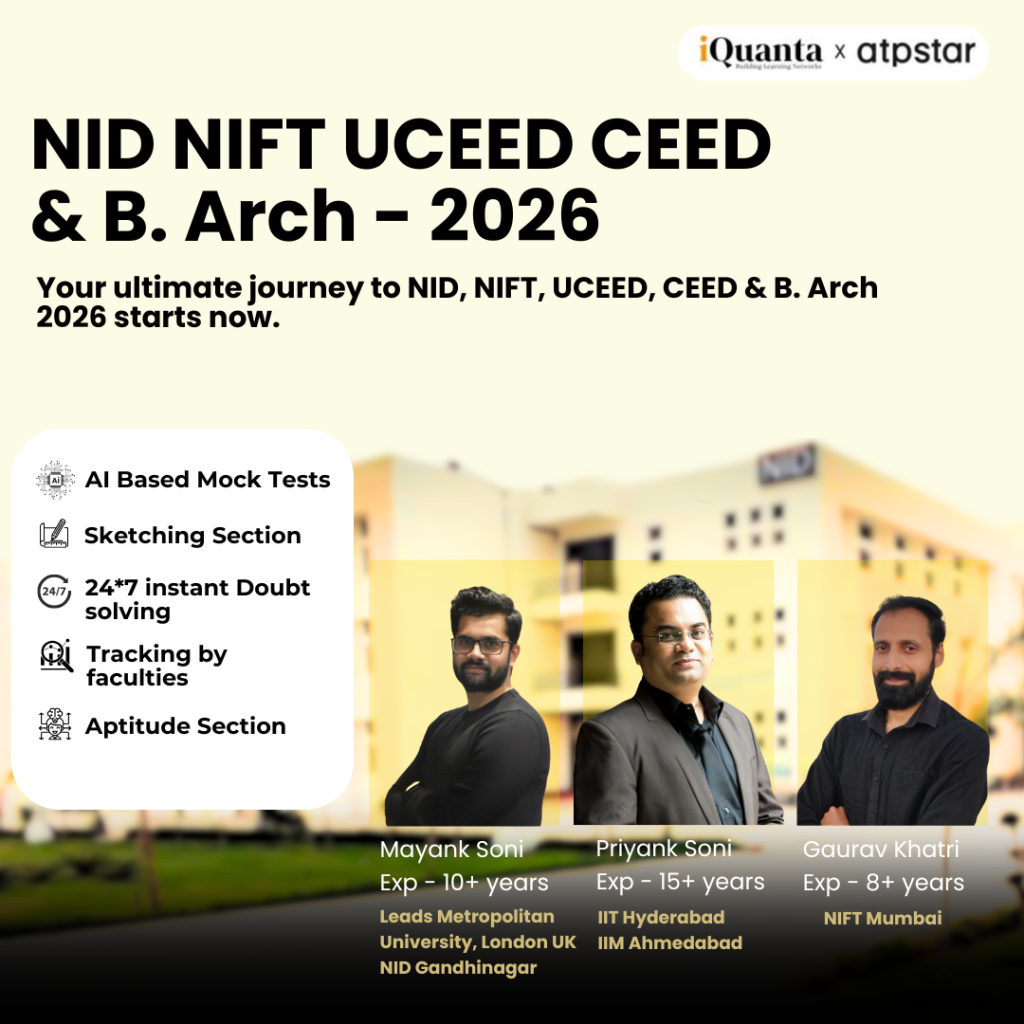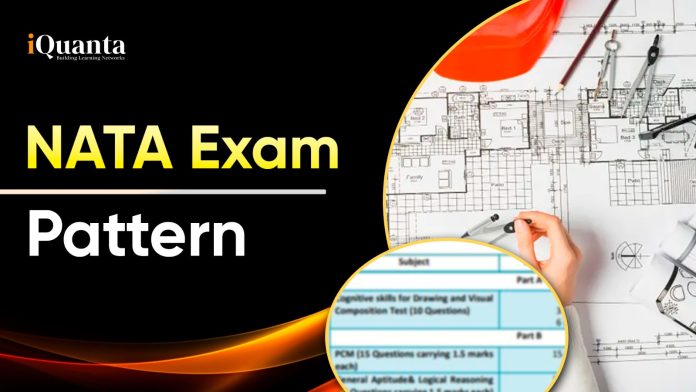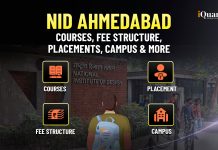If you are planning to pursue architecture in India, the NATA exam (National Aptitude Test in Architecture) is a key step towards taking an admission to top architectural colleges. The Council of Architecture (CoA) conducts the NATA exam for admission to the 5-year B.Arch program offered by various colleges and institutions. This test evaluates the architecture aptitude of candidates. Understanding the NATA exam pattern, NATA syllabus, and preparation tips for the NATA exam is crucial for strategic preparation and high performance.
Join this free whatsapp group to get preparation strategies, resources, and updated information about Design exams

NATA 2025 Exam Pattern
The National Aptitude Test of Architecture (NATA) is a national-level entrance exam that assesses a candidate’s ability in areas of drawing, aesthetic sensitivity, logical reasoning, and critical thinking. As per the CoA, the exam is held in multiple phases annually; candidates can appear in more than one phase to improve their score. The best score out of all attempts is considered for admission.
The Council of Architecture published the NATA exam pattern for 2025 on the official website, www.nata.in. Let’s dive in to know the detailed NATA exam pattern for the NATA entrance exam 2025.
| Particulars | Description |
| Name of Entrance Exam | NATA |
| Testing Authority | Council of Architecture |
| Exam Mode | Both Offline and Online |
| Frequency | Thrice in a year |
| Number of Sections | The exam will have two parts:Part A- Drawing and Composition Test (offline)Part B- Computer-Based Adaptive Test |
| Types of Questions | Part A A1 – 1 Question – Composition and ColourA2 – 1 Question – Sketching and Composition (Black and White)A3 – 1 Question – 3D Composition Part B -B1 – 42 MCQ QuestionsB2 – 8 NCQ Questions |
| Duration | 3 Hours |
| Total Number of Questions | 53 |
| Total Marks | 80 Marks (Part A ) + 120 Marks (Part B) = 200 Marks |
| Negative Marking | NO |
| Language | English and Hindi |
| Number of Test Cities/Centres | 128 |
| Course Available after the Exam | B.Arch |
Assessment of Candidate’s Aptitude
As per the NATA exam pattern 2025 mentioned in the official brochure, the aptitude of the candidate will be assessed using some or all of the following techniques:
Part A
Drawing and Composition Test
| Assessment | Description |
| Composition and Color | Creating suitable compositions for various situations and coloring them. Re-arranging various shapes in a visually appealing manner and coloring it suitably. |
| Sketching and Composition (Black & White) | Ability to draw, visualize, depict a situation, involving buildings/its components, people, environment, products with an understanding of scale, properties, textures, shades, shadows, etc. |
| 3D Composition | Creating interesting 3D compositions for the given situation using the provided kit. |
PART B
General Aptitude
| Assessment | Description |
| Visual Reasoning | Ability to understand and reconstruct 2D and 3D composition, knowledge about its composition and technical concepts |
| Logical Derivation | Ability to decode a situation, composition, context, and generate meaning. Understanding the minute information hidden in a particular situation and drawing conclusions. |
| G.K., Architecture & Design | General awareness of architecture and design, current trends, and recent issues. Knowledge about important buildings, historical progressions, and innovation in materials and construction technology. |
| Language Interpretation | Ability to correctly and logically generate the meaning of words and sentences, understanding of English grammar. |
| Design Sensitivity and Thinking | Ability to observe, record, and analyze people, space, products, and the environment. Critical thinking, reasoning, and the ability to identify the subtle communications. Ability to understand semantics, metaphors, problem identification and definition, and analysis of a given situation. |
| Numerical Ability | Basic Mathematics and its association with creative thinking. To unfold a space with use of geometry. |
Detailed NATA Syllabus 2025
The NATA syllabus is designed to test both cognitive and architectural aptitude. While drawing was a prominent section in earlier years, the updated syllabus emphasizes mental ability, creativity, and perception skills.
Here’s a comprehensive breakdown of subjects and concepts covered under NATA 2025 syllabus:
- Diagrammatic Reasoning
This section examines the candidate’s ability to interpret and analyze diagrams, often used in architectural plans and visual representations.
Topics Covered:
- Interpretation of 2D and 3D figures
- Construction and analysis of geometric patterns
- Visual arrangements of objects
- Mapping and spatial layouts
- Numerical Reasoning
This section evaluates basic mathematical ability and numerical logic, essential for design dimensions, budgets, and construction estimations.
Topics Covered:
- Basic arithmetic (additon, substraction, multiplication, division)
- Percentages, ratios, and proportions
- Algebra and number series
- Mensuration and geometry
- Data interpretation and graphs
- Verbal Reasoning
This section checks a candidate’s ability to comprehend and reason using concepts framed in words.
Topics Covered:
- Synonyms and antonyms
- Sentence completion
- Reading comprehension
- Syllogisms and logical deduction
- Language-based analogies
- Inductive Reasoning
This section is about identifying patterns and trends to make predictions—an essential design-thinking skill.
Topics Covered:
- Series completion (number, alphabet, figures)
- Matrix pattern recognition
- Logical classification
- Coding-decoding patterns
- Logical Reasoning
Logical Reasoning evaluates arguments, identifying assumptions, and drawing conclusions.
Topics Covered:
- Analytical reasoning
- Logical puzzles
- Blood relations and direction sense
- Statement and conclusions
- Decision-making problems
- Situational Judgement
These questions assess how well a candidate can make ethical and rational decisions in real-life scenarios, especially in architecture contexts.
Topics Covered:
- Ethical dilemmas in architectural practice
- Prioritization in planning
- Response to clients and stakeholders
- Urban space management decisions
- Abstract Reasoning
This section evaluates the ability to recognize patterns and logical rules in shapes and designs—a key for creative design thinking
Topics Covered:
- Visual analogies
- Shape transformation
- Symmetry and tessellations
- Hidden figures
- Cognitive Abilities
One of the most unique aspects of NATA 2025, this segment involves real-time problem-solving and mental performance.
Topics Covered:
- Memory retention and recall
- Visual memory and mental rotation
- Perceptual speed and accuracy
- Attention distribution and concentration
- Mental mapping and organization
- General Awareness and Architecture Knowledge
This section checks GK about architecture, sustainable development, and famous works in the architecture field.
Topics Covered:
- Indian and International architectural history
- Famous architects and their iconic projects
- Sustainable building concepts
- Building materias and technology
- Urban planning basics
NATA 2025 Preparation Tips
Let’s look at the best NATA preparation tips subject-wise for general aptitude, drawing, and mathematics:
- To score good scores in general aptitude, candidate should should keep general knowledge updated
- One should have strong knowledge on topics like buildings in India and the world, speed, distance and time, important architects, logical and reasoning ability questions, general maths like area, volume mirror image, terminology, etc.
- Revise basic maths formulae from profit and loss, area and proportion, probability, speed and distance, interest, etc.
- Develop a habit of making a small thumbnail to plan everything, like placing what and how to utilize the answer sheet.
- Practice freehand straight lines regularly without using the sclae in a minimum 5-7 sheets.
Join iQuanta and Crack NATA 2025
iQuanta offers one of the best online courses for B.Arch aspirants. Students will be fully equipped with expert mentors, structured study plans, 24*7 doubt solving, and regular practice to secure their place in a top architecture college. iQuanta conducts Application classes following each live sessions, where students work through problems based topics that were recently covered. For the NATA 2025 entrance exam, this practice-based learning aids students in developing strong problem-solving abilities and a deeper understanding of concepts.
iQuanta’s 24 hour question-and-answer allows student to ask questions at any time which ensures continues learning without interruptions. Our AI powered tools gives instant answer to student question. Every student enrolling for our NATA 2025 coaching program will have access to expert mentors who will assist them with study planning, clarifying questions, and stayed motivated during preparation.
With iQuanta’s NATA 2025 online coaching, you get a complete roadmap to success in your exam preparation. Our NATA 2025 online course is designed to guide you through every step of your preparation. With expert instructors, personalized mentorship, and 24/7 doubt-solving support, you will build a strong foundation in Mathematics, Aptitude, and Drawing. Our 2025 NATA full course also provides ample practice with mock tests to ensure you’re fully prepared to tackle the exam with confidence.
Start your journey with iQuanta today and take the first step toward your dream architecture college. Enroll today!





